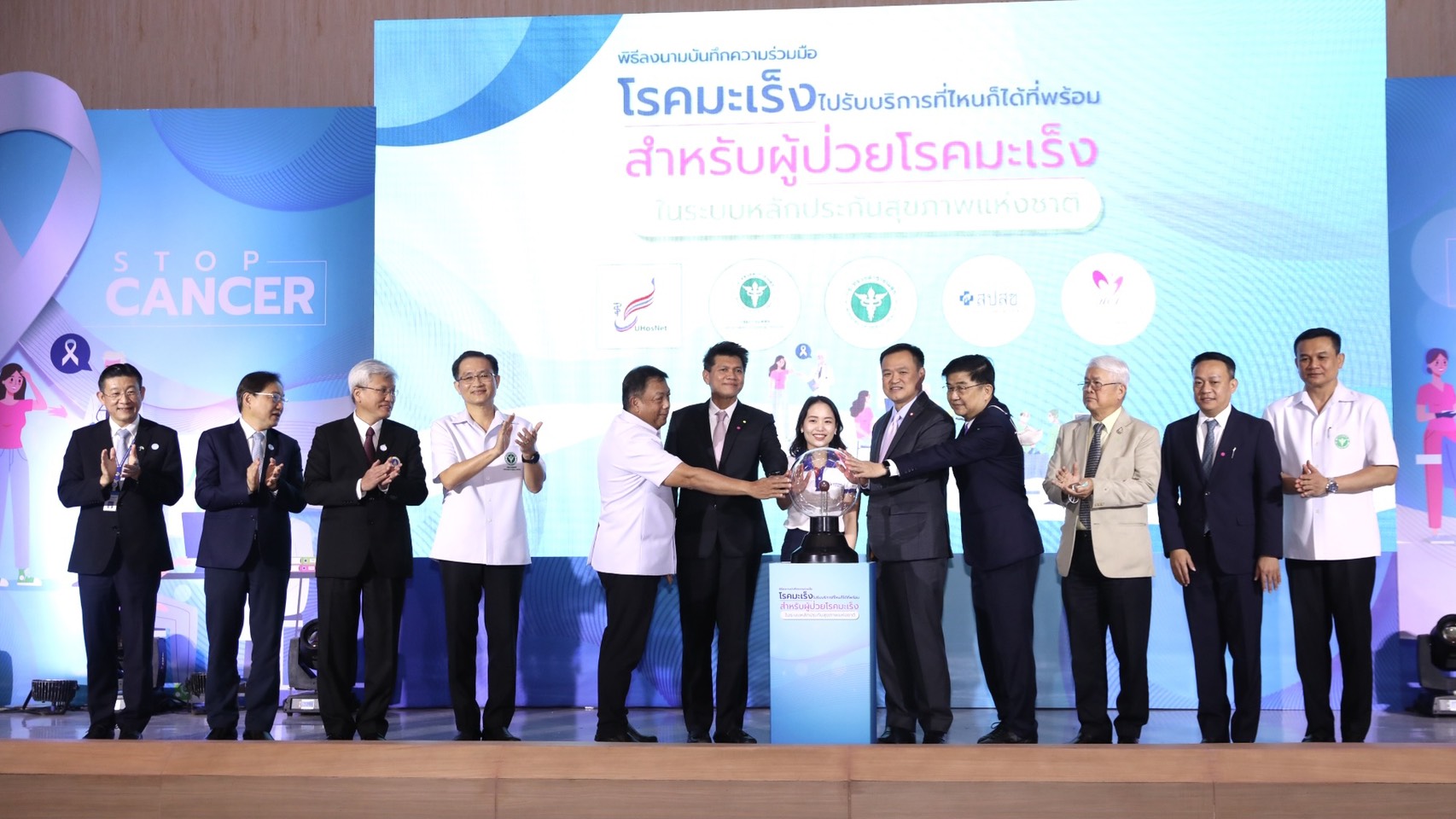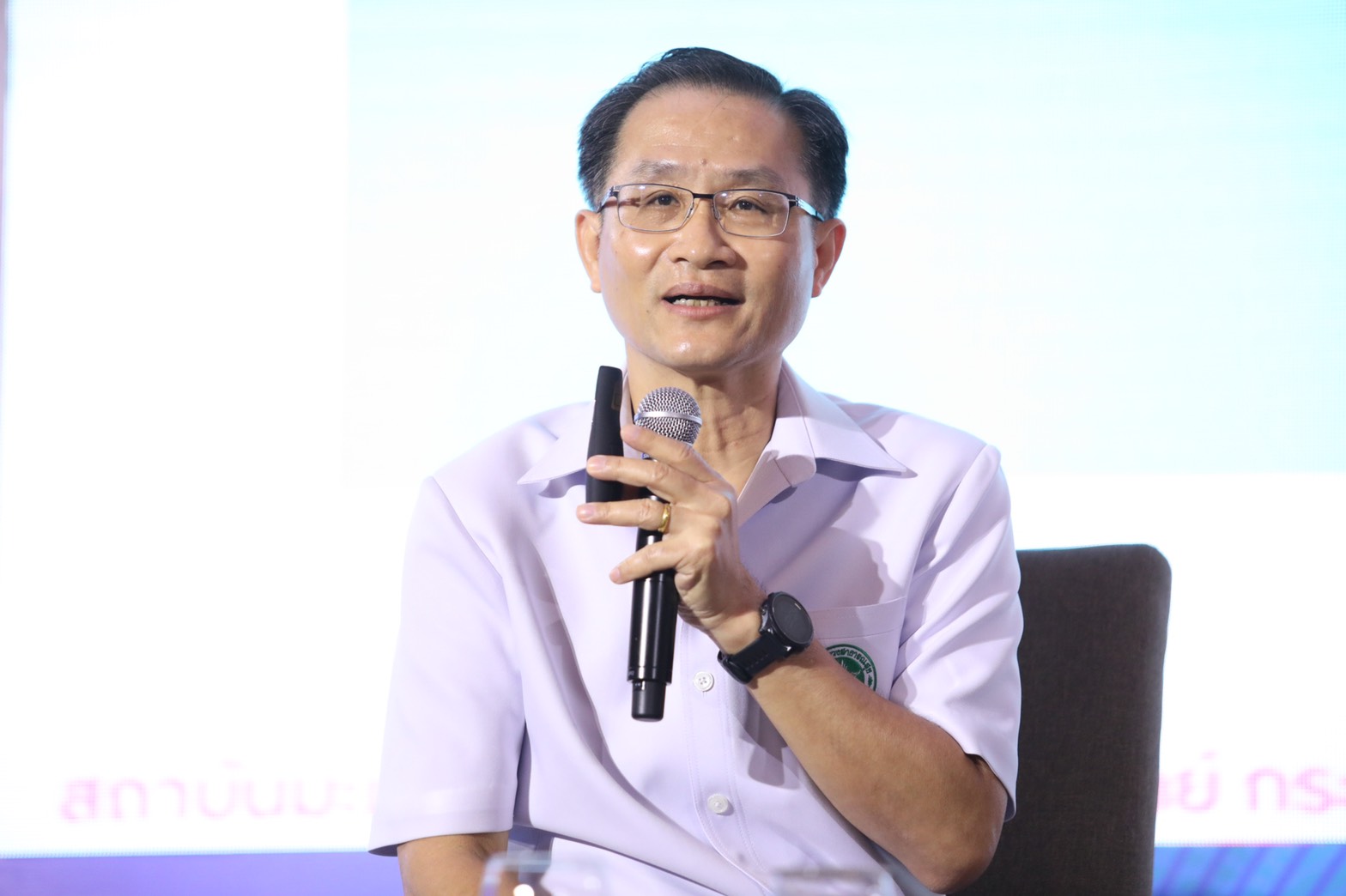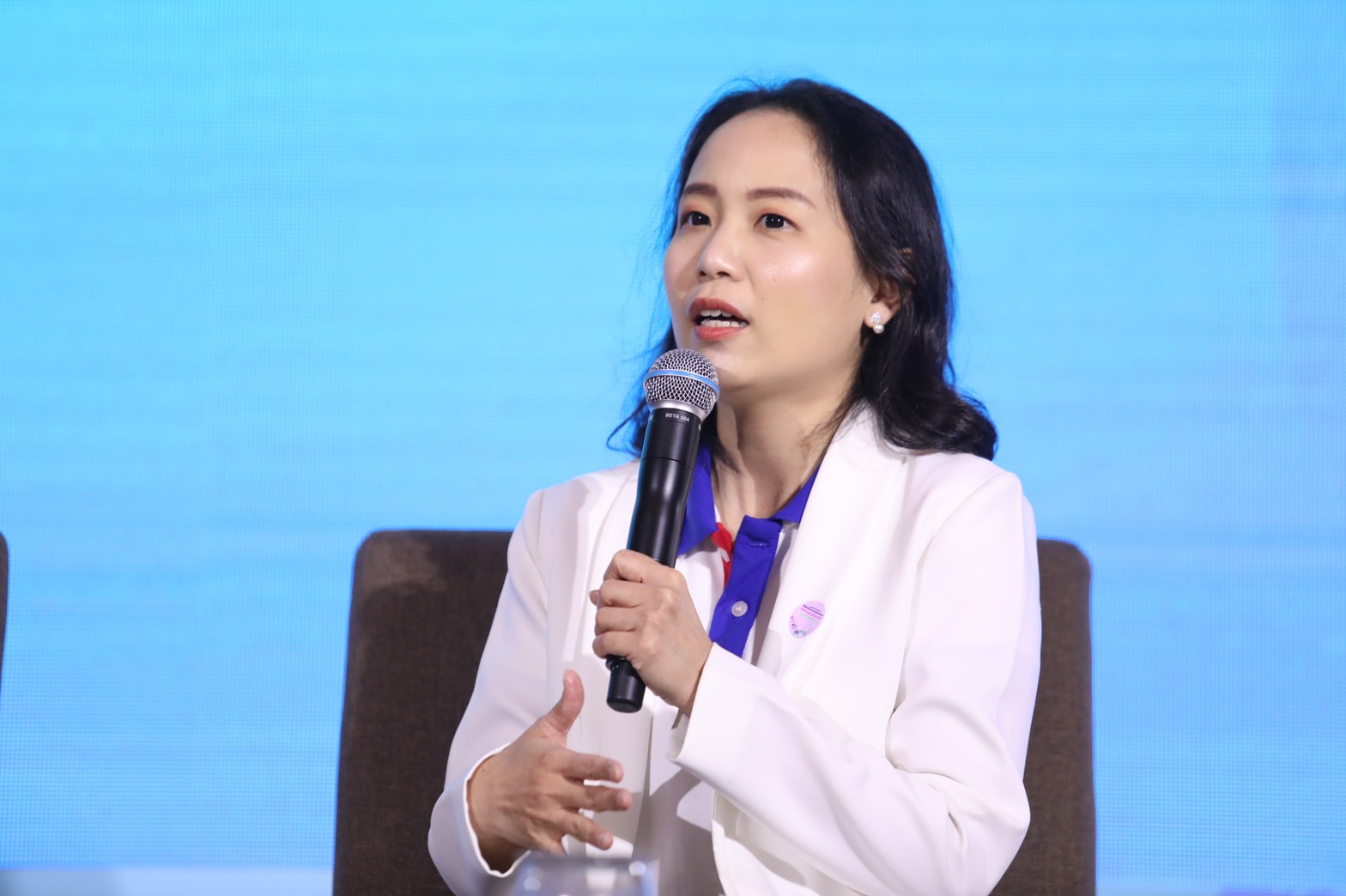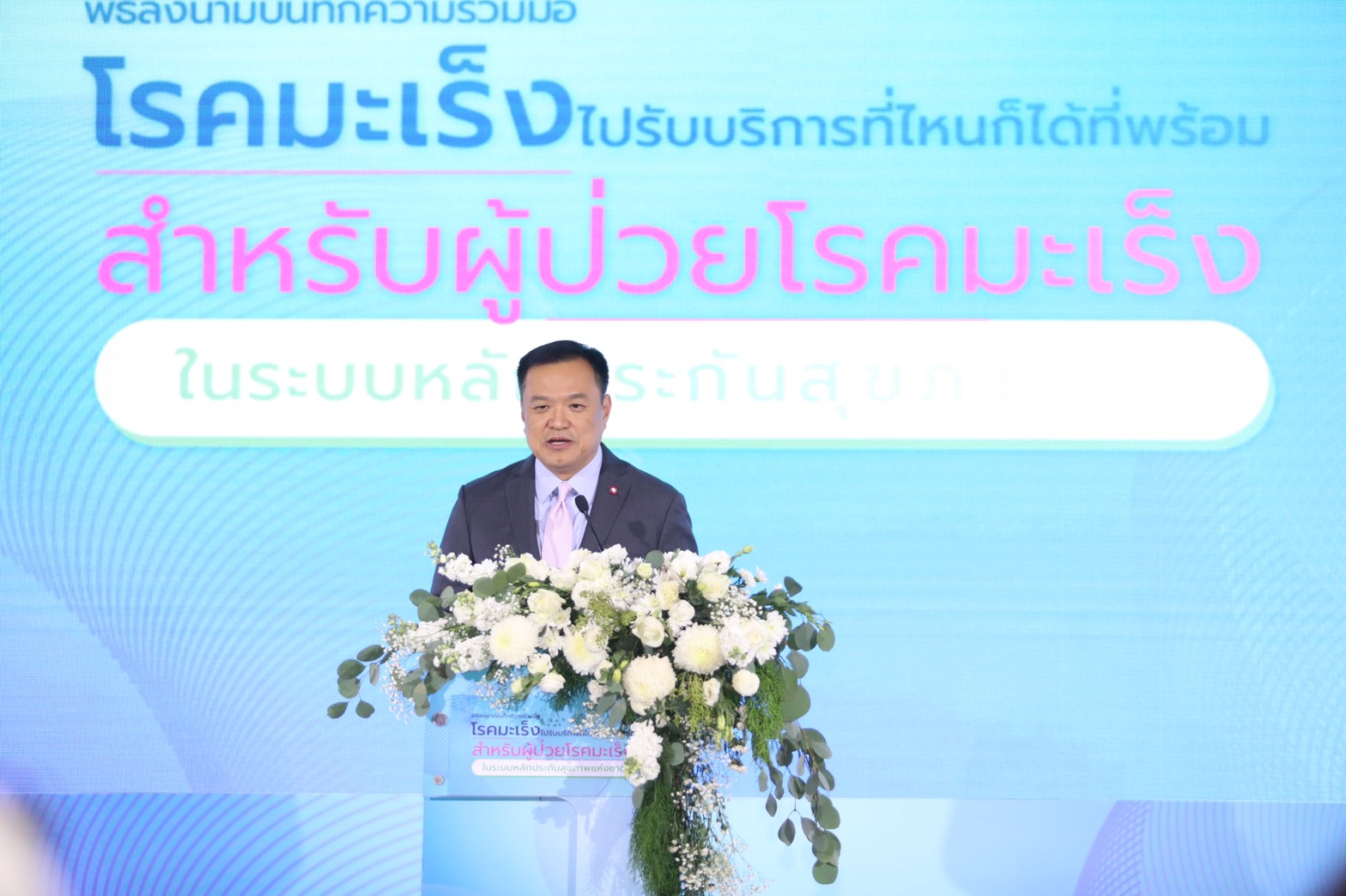
- Home
- DescriptionNews
Cancer patients under UCS can now choose desired hospitals near them

Cancer patients under UCS can now choose desired hospitals near them
It is every patient’s dream to be in good hands of oncologists at one of the country’s most reputable medical institutions, when diagnosed with cancer. That explains why queues at these cancer-treating facilities are usually lengthy while cancer treatment can’t really wait.
For this reason, the government has come up with a new policy to equip more hospitals with expensive medical devices for and a medical team trained specifically on cancer treatment so that patients who are diagnosed with cancer in any parts of the country have more choices than key cancer-treating hospitals and institutions in Bangkok to choose from.

The ambition in this major step to improve the country’s cancer treatment and care system is to allow all cancer patients under the Universal Coverage Scheme (UCS) to browse through a list of hospitals and medical institutions capable of treating cancer near them as their choices as if they are booking a cinema ticket online, said Dr. Somsak Akksilp, Director-General of the Department of Medical Services (DMS).
Each year between 120,000 and 140,000 are diagnosed with cancer, or approximately 120 per 100,000 people, while between 70,000 and 80,000 people died of cancer every year, said Dr. Sura Wisedsak, Deputy Permanent Secretary of the Public Health Ministry.
The most common cancer in Thailand are liver cancer, lung cancer, breast cancer, colorectal cancer, gastric cancer and cervical cancer, he said, adding that the rates of new cases of these cancers are rising gradually.
In response to the country’s cancer situation, the ministry has been improving its cancer care system with a comprehensive array of diagnostic capabilities and treatment therapies nationwide so that cancer patients in other provinces no longer have to travel all the way to Bangkok for
All 12 health regions of the ministry are now equipped with high-tech attack cancer machines and a sufficient number of oncologists and other healthcare workers trained specifically on cancer care. Although hospitals in these health regions may not have the newest cancer treatment technology those University hospitals have, they can now offer cancer treatment with a good standard, he said.
“I understand that everyone is worried and want the best quality of cancer treatment when told he or she has cancer. But wouldn’t it be better for all cancer patients if they can choose to receive treatment at a good cancer-treating hospital closer to their home?” he said.
The challenge is how to get all hospitals offering cancer treatment to share information among them to ensure every cancer patient in any parts of the country receives cancer treatment seamlessly, he said.

Some cancer patients look for a hospital capable of treating cancer that is closest to their homes, while others prefer a University hospital no matter how far it is from where they live, said Sirinthip Khattiyakan, president of Thai Cancer Society (TCS).
“However, they may not be aware that those well-known top-notch doctors, too, have 24 hours a day as do other oncologists who actually are as good as them,” she said.
In this case, the TCS has a role in sharing necessary information about cancer treatment and others experiences by patients from different hospitals among patients and their families, also encouraging them to choose the most convenient choice with good quality of treatment, she said.
Three key elements in successful cancer treatment therapies depends on the good quality of care or treatment, the speed of treatment, the ongoing-evaluation and continuity of treatment, said Dr. Somsak.
“As a former cancer patient myself, I totally understand just how every patient desperately wants treatment with good quality,” said Dr. Somsak who had previously been diagnosed with, treated for and fully recovered from lymphoma of the nasal cavity.
In supporting the implementation of a policy by Deputy Prime Minister and Public Health Minister Anutin Charnvirakul to allow cancer patients to choose a desired cancer-treating healthcare facility, the Department of Medical Services and the National Cancer Institute (NCI) have jointly developed some technology innovation, said Dr. Somsak.
First, the facility mapping concerning cancer treatment resources each hospital has such as the radiotherapy equipment, which allows every hospital taking part in this cancer treatment system to see what equipment at which hospital is available for use and when, he said.
Second, development of Thai Cancer Based (TCB) Plus, a computer program that supports referral of a cancer patient from hospital to another nationwide, he said.
Third, the development of “The 1”, an online-based platform to allow hospitals, including University hospitals, to book cancer treatment queues online within just a few clicks, he said.
Fourth, the training of hospital cancer coordinators whose main responsibility is to assist cancer patients to choose a suitable and desired cancer-treating facility using the TCB Plus and The 1 platform, he said.
The other work is the development of a mobile application to allow patients to gain access to a data set containing details of their cancer treatment including medicines prescribed to them, he said.
All these patients have to do is download into their mobile phones. The application available for both Android and iOS operating systems, and connect it to the TCB Plus and The 1, he said.
These patients will no longer need to carry with them their paper-based medical records to hospitals to where they are referred for cancer treatment as their records and referral documents will be sent to the concerned hospitals electronically, he said.
The new cancer treatment system is estimated to require 880 million baht in additional budgeting per year, which the National Health Security Office (NHSO) has already set aside for this purpose, said Dr. Jakkrit Ngowsiri, Deputy Secretary-General of the NHSO.
He assured all patients and hospitals participating in this cancer treatment programme that the budget prepared for this programme is sufficient.
The NHSO believes this programme will maximise the efficiency of the country’s cancer treatment and decrease the number of deaths caused by cancer, he said.
This new cancer treatment system will help the country maximise cancer treatment resources and achieve a better overall outcome of cancer treatment, said Associate Professor Surasak Leelaudomdipi, President of University Hospital Network (UhosNet).
“Overall, this system will make the investment in new cancer treatment technology by all cancer-treating facilities worth it. A unit of radiotherapy equipment, for instance, cost several hundreds million baht and it should be used as much as possible to make it worth investing,” he said.

Because cancer is the number one killer in Thailand, the government always gives a priority to the continuous development of the treatment system, said Mr. Anutin.
But despite how advanced cancer treatment resources have become over the past years, lengthy queues at the country’s main cancer-treating hospitals remained a major hindrance to the improvement in access by all cancer patients to quality treatment, he said.
That is why the government has come up with this new cancer treatment system that will improve convenience for an access of patients to standard cancer treatment, he said.
“As a New Year gift to all Thais, the new cancer treatment programme is now ready to begin from Jan 1, 2021,” he said.

